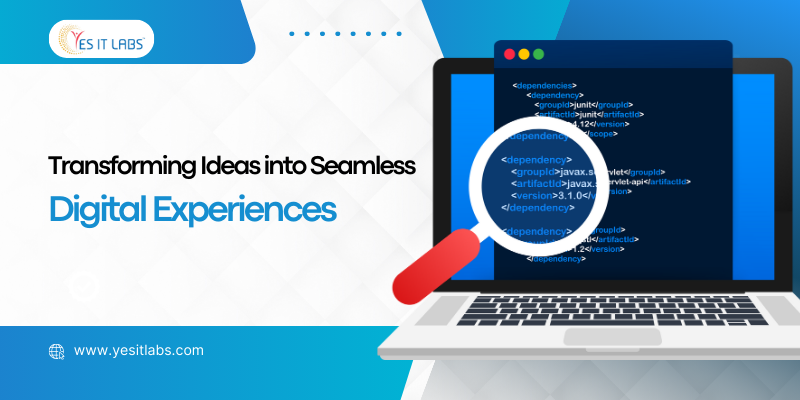
 By Luna Watkins
By Luna Watkins Building Cross-Platform Apps: Why Your Business Needs a Mobile Software Development Company
Businesses today need a mobile app to succeed in the digital era. With more people using smartphones and tablets, businesses are turning to a mobile software development company to create apps that work on multiple platforms. These apps help your product or service reach more people, no matter their device. But why should your business partner with a mobile software development company? Let’s explore the reasons and benefits, especially for businesses in the USA.
What Is Cross-Platform App Development?
Understanding Cross-Platform Apps
Cross-platform apps are designed to work on different operating systems like iOS, Android, and Windows, all from a single codebase. Unlike native apps, which are built specifically for one platform, cross-platform apps let businesses reach users across various devices without needing to create separate apps for each platform. This approach saves both time and money, making it a smart choice for businesses of all sizes.
Why Mobile Apps Matter in the USA
In the USA, the use of mobile apps has grown rapidly. People spend more time on mobile apps than on desktops or mobile browsers. Whether it’s shopping, banking, or social media, Americans rely heavily on mobile application development for their daily needs. For businesses, this trend offers a great opportunity to connect with customers in a more direct and personalized way.
Why Cross-Platform Development Is a Smart Choice
Save Money
One of the main reasons businesses choose cross-platform development is to save money. Developing a separate app for each platform can be expensive and take a lot of time. Cross-platform development allows businesses to create a single app that works on multiple platforms, which cuts down on development costs. This makes mobile app development for companies more affordable and accessible, especially for startups and small businesses.
Launch Your App Faster
In the competitive US market, speed matters. Cross-platform development helps businesses launch their apps more quickly than if they were to develop separate native apps for each platform. With one codebase, developers can work faster, and businesses can get their apps to market sooner, giving them a competitive edge in mobile application development.
Consistent User Experience
Providing a consistent user experience across different devices is key to maintaining your brand’s reputation. Cross-platform apps ensure that users have the same experience, whether they’re on an iPhone, an Android device, or a tablet. This consistency helps build trust and loyalty among customers, which is essential for long-term success in the US market.
Reach a Wider Audience
By developing a cross-platform app, your business can reach more people. In the US, where consumers use a variety of devices, your app must work on all major platforms. Cross-platform apps eliminate the need to choose between iOS and Android, allowing you to target both groups of users at the same time, enhancing your mobile app development for company strategy.
How a Mobile Software Development Company Can Help
Expertise in Cross-Platform Development
A mobile software development company has the expertise to use cross-platform frameworks like Flutter, React Native, and Xamarin. These tools make the development process easier and ensure that your app works well across different platforms. By working with a mobile software development company, your business can be sure that your app is built using the best tools and technologies.
Custom Solutions for Your Business
Every business has unique needs, and so do their apps. A mobile software development company can provide custom solutions that match your business goals and target audience. Whether you need a feature-rich e-commerce app or a simple utility app, a development company can tailor the app to meet your specific needs in mobile application development.
Ongoing Support and Maintenance
Building an app is just the first step; keeping it up-to-date is just as important. A mobile software development company offers ongoing support and maintenance to make sure your app stays current with the latest updates, security measures, and user expectations. This approach helps minimize issues and ensures a smooth user experience.
Scalability for Future Growth
As your business grows, so will the number of people using your app. A mobile software development company can design your app to handle more traffic and additional features as your business expands. This forward-thinking approach is crucial for long-term success, especially in a competitive market like the US.
Benefits of Partnering with a Mobile Software Development Company
Access to a Global Team of Experts
When you partner with a mobile software development company, you get access to a global team of developers, designers, and strategists. These professionals bring different perspectives and skills, which can lead to creative and high-quality apps. This international approach is particularly beneficial for US businesses looking to create apps that appeal to a wide audience.
Lower Development Risk
Developing an app comes with risks, from technical challenges to market uncertainties. A mobile software development company can help reduce these risks by following a structured development process, conducting thorough testing, and providing expert advice. This reduces the chances of costly mistakes and ensures that your app is delivered on time and within budget.
Focus on What You Do Best
Outsourcing mobile software development to a specialized company allows you to focus on your core business activities. Instead of diverting resources and attention to app development, you can concentrate on what you do best—whether it’s serving customers, creating products, or expanding your market reach. This strategic focus can lead to better business outcomes and higher profits.
Enhanced Security and Compliance
Security is a top concern for businesses, especially in the US, where data privacy laws are strict. A mobile software development company can ensure that your app complies with regulations like GDPR and CCPA and implements strong security measures to protect user data. This level of expertise is crucial for maintaining user trust and avoiding legal problems.
How to Choose the Right Mobile Software Development Company
Look at Their Portfolio
When choosing a mobile software development company, start by looking at their portfolio. Check out examples of cross-platform apps they’ve developed, especially those that are similar to what you need. A strong portfolio is a good sign that the company has the skills to deliver quality work in mobile application development.
Read Client Reviews
Client reviews and testimonials can give you valuable insights into a company’s reliability and communication skills. Look for feedback from previous clients, especially those based in the US, to see if the company can meet your expectations.
Evaluate Their Technical Skills
Cross-platform development requires a deep understanding of various tools and technologies. Make sure the mobile software development company you choose has a team of developers with expertise in the frameworks you’re interested in, such as React Native or Flutter. Also, ask about their experience with integrating third-party services, APIs, and cloud-based solutions.
Consider Their Communication Skills
Good communication is key to a successful partnership. Choose a mobile software development company that values transparency, keeps you updated throughout the development process, and is open to feedback. Strong collaboration between your team and the development company will lead to a better final product.
Choose a Company with US Market Experience
Since your target audience is in the US, it’s beneficial to work with a mobile software development company that has experience in the US market. This ensures that they understand the unique preferences, trends, and regulations that apply to US businesses and consumers.
The Role of Offshore Software Development in Cross-Platform Apps

Outsourcing Mobile Software Development to offshore companies can be a cost-effective solution, especially for small and medium-sized businesses in the US. Offshore software development offers access to a broader talent pool, often at a lower cost. Companies specializing in offshore software development can handle everything from design to deployment, allowing your business to benefit from global expertise while keeping costs down.
Collaboration Across Time Zones
One of the advantages of offshore software development is the ability to work across different time zones. This means that your project can move forward even when your in-house team is off the clock. By outsourcing mobile software development, you can ensure a continuous workflow, leading to faster project completion and a quicker time-to-market.
Conclusion: The Future of Cross-Platform Apps in the US
The demand for mobile apps in the US will only increase, making it essential for businesses to stay ahead of the curve. By choosing cross-platform app development and partnering with a mobile software development company, your business can create high-quality apps that reach more people, offer a consistent user experience, and drive growth.
In an increasingly mobile-first world, building a cross-platform app is not just a technical choice—it’s a strategic one. With the right development partner, your business can use the power of mobile application development to engage customers, streamline operations, and achieve long-term success in the competitive US market. Whether you choose to work with a local team or leverage offshore software development, the key is to find a partner who understands your business goals and can deliver a solution that meets your needs.
Tags: app development for companies, application development, mobile application development, mobile software development, offshore software development, outsourcing mobile software development, outsourcing software development, software development companyLatest Resources
ChatGPT and DeepSeek: Which AI Tool Delivers Better User Experience?
January 29, 2025
Top Frameworks for Cross-Platform App Development in 2025
January 22, 2025
A Guide to Types of Artificial Intelligence (AI)
January 14, 2025
Key Benefits of React Native App Development
January 7, 2025
Leveraging AI in Startup Software Development: Trends and Tips
December 30, 2024















 Services
Services

